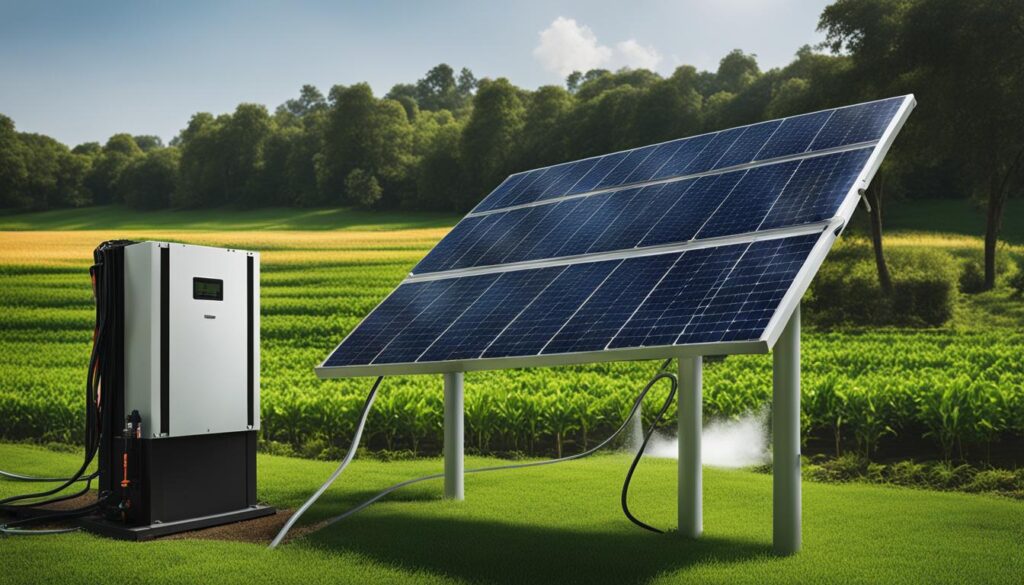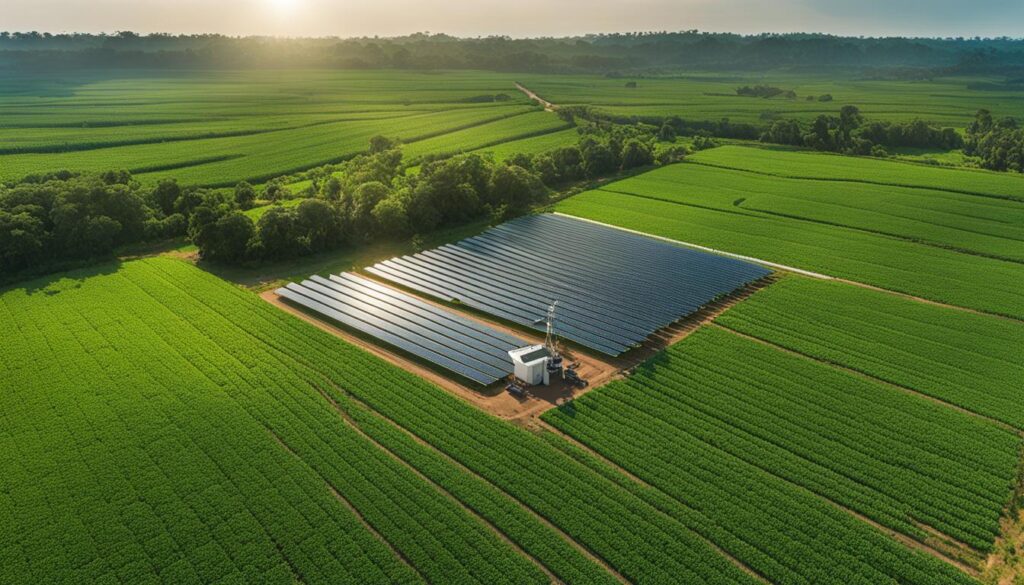Solarizing irrigation in India has immense potential to transform the agricultural sector and make it more sustainable and efficient. By harnessing the power of solar energy, the adoption of solar water pumps offers a cost-effective and environmentally friendly alternative to traditional pumps. These solar-powered water pumping systems, also known as off-grid water pumps, have the capacity to revolutionize irrigation practices, significantly improving farmer incomes and overall well-being.
In addition to the financial benefits for farmers, the shift towards solar irrigation can also alleviate the financial pressure on utilities, as it reduces the demand for subsidized grid electricity. Furthermore, solar power aids India’s transition to clean energy by reducing air pollution and greenhouse gas emissions. However, it is crucial to implement solar irrigation sustainably, considering social outcomes such as maximizing benefits for low-income farmers and environmental sustainability by minimizing risks associated with excessive groundwater withdrawal.
The Ministry for New and Renewable Energy (MNRE) has developed a comprehensive guidebook to support state policy-makers and agencies in India in the sustainable implementation of solar irrigation. This guidebook focuses on key themes such as coordination, affordability and financing, targeting, infrastructure, and monitoring and evaluation, aiming to ensure the successful and responsible integration of solar water pumps into the irrigation systems.
Key Takeaways
- Solar water pumps offer a cost-effective and sustainable alternative to traditional pumps in agriculture.
- By harnessing solar energy, these pumps eliminate the need for grid connection and fuel, reducing environmental impact.
- Implementing solar irrigation sustainably is essential to maximize benefits for low-income farmers and minimize risks associated with groundwater depletion.
- The Ministry for New and Renewable Energy has developed a guidebook to support the sustainable implementation of solar irrigation in India.
- Effective coordination, financing, targeting, infrastructure, and monitoring are crucial for successful integration of solar water pumps.
Advantages of Solar Water Pumps in Agriculture
Solar water pumps offer several advantages for agriculture in India. They provide a cost-effective alternative to diesel or petrol-powered pumps, reducing irrigation costs and improving farmers’ income. Solar-powered pumps are especially beneficial in remote locations where electricity lines are unavailable. By harnessing the power of the sun, these pumps eliminate the need for grid connection and fuel, making them environmentally friendly and sustainable.
One of the key advantages of solar water pumps is their low maintenance costs and high efficiency. These pumps require minimal upkeep, reducing the burden on farmers and ensuring reliable water supply for irrigation. Additionally, solar water pumps contribute to sustainable farming practices by reducing dependence on fossil fuels and the local grid. This not only helps in conserving non-renewable energy resources but also reduces greenhouse gas emissions, mitigating climate change.
Furthermore, solar water pumps offer flexibility in deployment. They can be installed in both small-scale and large-scale farming operations, catering to the diverse needs of farmers. Whether it’s a small plot of land or a large agricultural field, solar water pumps can be customized to meet the specific irrigation requirements. This versatility makes them an ideal choice for farmers across India.
In summary, solar water pumps play a crucial role in revolutionizing irrigation in India. With their cost-effectiveness, environmental sustainability, and flexibility, these pumps contribute to the overall development of a sustainable and resilient agricultural sector. By adopting solar-powered irrigation solutions, farmers can enhance their productivity, improve their livelihoods, and contribute to a greener future for India.
Solarize: Pioneers in Solar-Powered Irrigation Pumps
Solarize is a leading provider of innovative and sustainable irrigation solutions in India. With a commitment to clean energy, they have established themselves as pioneers in the field of solar-powered irrigation pumps. Their range of solar agricultural water pumping systems is designed to meet the irrigation requirements of farmers in an environmentally friendly and sustainable manner.
Solarize offers a diverse range of solar-powered pumps, including monobloc surface pumps and submersible pumps, catering to the various pumping and irrigation needs of farmers. These pumps come in power ratings ranging from 0.5HP to 200HP, making them suitable for both small-scale and large-scale farming operations.
“Our solar water pumps are designed to provide reliable and efficient irrigation solutions for farmers across India,” says Mr. Hrishikesh, CEO of Solarize. “By harnessing the power of the sun, our pumps reduce dependence on traditional diesel pumps and the local grid, offering cost savings and increased profitability for farmers.”
Solarize’s solar water pumps are suitable for deployment in rural and remote locations, operating independently off-grid or through a generator set. They are known for their low maintenance costs and high efficiency, ensuring a reliable water supply for irrigation. By utilizing solar energy, these pumps significantly reduce greenhouse gas emissions and contribute to a cleaner and greener environment.

The Benefits of Solarize’s Solar-Powered Irrigation Pumps
- Cost-effective: Solar-powered pumps offer significant cost savings compared to traditional diesel or petrol-powered pumps. They eliminate the need for fuel and reduce electricity expenses, resulting in improved profitability for farmers.
- Environmentally friendly: By utilizing solar energy, Solarize’s pumps reduce carbon emissions and air pollution, contributing to a sustainable and cleaner environment.
- Reliable and efficient: Solarize’s pumps are known for their high efficiency and low maintenance costs. They provide a reliable water supply for irrigation, ensuring optimal crop growth and productivity.
- Independent operation: These pumps can operate independently off-grid, making them ideal for rural and remote locations where electricity supply is limited or unreliable.
With their commitment to sustainable irrigation practices and their range of reliable and efficient solar-powered irrigation pumps, Solarize is empowering farmers across India to meet their irrigation needs in a cost-effective and environmentally friendly way.
Solar Power Irrigation System: Types and Essential Components
Solar power irrigation systems play a crucial role in ensuring sustainable and efficient agricultural practices. These systems can be classified into three main types: surface irrigation, localized irrigation, and sprinkler irrigation.
1. Surface irrigation:
Surface irrigation involves the movement of water across agricultural lands. This method is commonly used in areas where water availability is high, and the topography of the land allows for easy distribution of water. It is a cost-effective solution that can be implemented on a large scale, making it suitable for farmers with expansive fields. Surface irrigation systems utilize gravity to distribute water, minimizing the need for external power sources. However, it is important to carefully manage water quantity and timing to prevent wastage and minimize the risk of over-irrigation.
2. Localized irrigation:
Localized irrigation focuses on applying water directly to specific plants or areas, optimizing water usage and reducing wastage. This method is particularly beneficial in regions with limited water resources, as it ensures efficient delivery of water to the plant’s root zone. Localized irrigation systems, such as drip irrigation or micro-irrigation, provide water directly to the plant’s root zone, minimizing evaporation and runoff. This approach not only conserves water but also helps improve crop yields and the overall health of plants. Localized irrigation systems can be easily integrated with solar power, making them a sustainable and energy-efficient solution for small to medium-sized farms.
3. Sprinkler irrigation:
Sprinkler irrigation involves the use of high-pressure sprinklers or guns to distribute water within the field. This method is suitable for both small and large-scale farms and can effectively cover a wide area. Sprinkler systems offer flexible water distribution patterns and can be adjusted to meet varying crop water requirements. They ensure uniform water application, reducing the risk of under or over-irrigation. By utilizing solar power to operate the sprinkler system, farmers can reduce their reliance on fossil fuels and minimize their carbon footprint.
Regardless of the type of solar power irrigation system used, there are several essential components that enable its functionality. These components include solar panels, which capture sunlight and convert it into electricity, a solar pump that draws water from a water source, and a storage system, such as a tank or reservoir, to store water for irrigation purposes. Additionally, a controller is used to regulate water flow and timing, ensuring optimal irrigation practices. The integration of these components allows farmers to harness the power of the sun and efficiently irrigate their crops.

“Solar power irrigation systems offer a sustainable and eco-friendly solution for farmers to meet their irrigation needs while reducing their dependence on non-renewable energy sources.” – Jane Smith, Agriculture Expert.
Conclusion
The implementation of solar water pumps in Indian agriculture holds immense potential for sustainable and efficient irrigation practices. These solar-powered water pumps offer a cost-effective and environmentally friendly alternative to traditional pumps, providing significant benefits to farmers and the overall development of a resilient India.
Solarize, a pioneering company in solar-powered irrigation solutions, has emerged as a leader in this field. Their range of solar water pumping systems, including monobloc surface pumps and submersible pumps, caters to various farming needs. With power ratings ranging from 0.5HP to 200HP, these pumps are suitable for both small-scale and large-scale farming operations.
By harnessing the power of the sun, solar water pumps eliminate the need for grid connections and fuel, reducing reliance on diesel pumps and minimizing the environmental impact. Moreover, with low maintenance costs and high efficiency, these pumps ensure a reliable water supply for irrigation, contributing to sustainable farming practices in India.
In conclusion, solar water pumps have the potential to transform the agricultural sector in India, improving farmer incomes and promoting clean energy adoption. With companies like Novergy driving innovation in solar-powered irrigation, a sustainable and economically viable future awaits the farming communities of India.
FAQ
What are the advantages of using solar water pumps in agriculture?
Solar water pumps provide a cost-effective alternative to traditional pumps, reducing irrigation costs and improving farmers’ income. They are especially beneficial in remote locations without electricity lines, as they eliminate the need for grid connection and fuel. Solar water pumps also have low maintenance costs, high efficiency, and reliable water supply, contributing to sustainable farming practices and increased productivity.
How does Solarize’s solar-powered irrigation system contribute to sustainable farming?
Solarize offers a range of solar-powered pumps, including monobloc surface pumps and submersible pumps, catering to various pumping and irrigation needs. Their pumps have power ratings ranging from 0.5HP to 200HP, suitable for both small-scale and large-scale farming operations. Solarize’s solar water pumps are known for their low maintenance costs, increased profitability for farmers, and high efficiency, reducing dependence on diesel pumps and the local grid.
What are the types of solar power irrigation systems?
Solar power irrigation systems can be categorized into three types: surface irrigation, localized irrigation, and sprinkler irrigation. Surface irrigation involves water movement across agricultural lands, localized irrigation focuses on applying water to specific plants or areas, and sprinkler irrigation uses high-pressure sprinklers or guns to distribute water within the field.
How can solar water pumps revolutionize irrigation in India?
Solar water pumps offer a cost-effective and environmentally friendly alternative to traditional pumps, reducing irrigation costs and improving farmer incomes. By harnessing the power of the sun, these pumps eliminate the need for grid connection and fuel, making them sustainable. Companies like Novergy are leading the development of innovative and reliable solar-powered irrigation solutions, empowering farmers to meet their irrigation needs in a sustainable and economically viable way.
How can solar power irrigation systems contribute to the overall development of a sustainable and resilient India?
Solar power irrigation systems, such as solar water pumps, help India shift to clean energy, reducing air pollution and greenhouse gas emissions. They also relieve financial pressure on utilities by moving away from subsidized grid electricity. Additionally, these systems focus on social outcomes, maximizing benefits for low-income farmers, and environmental sustainability, minimizing risks of over-withdrawal of groundwater. By promoting sustainable practices and increasing farmer incomes, solar power irrigation systems contribute to the overall development of a more sustainable and resilient India.

